
Search
for
Sort by
Research
690-720 / 1000+ results

research Erosive Pustular Dermatosis of the Scalp: Causes and Treatments
A rare scalp condition mainly in older women can be treated with various alternatives to steroids, which may have fewer side effects.

research A Pilot Study of a Grape Seed Procyanidin Extract for Lung Cancer Chemoprevention
Grape seed extract may safely and effectively help prevent lung cancer.

research Fibrosing Alopecia in a Pattern Distribution in 16 African-Descent and Hispanic Female Patients: A Challenging Diagnosis
FAPD is a possible diagnosis for hair loss in patients of color and requires multiple evaluations for accurate diagnosis.

research Role of Leukocyte-Platelet-Rich Fibrin in Endoscopic Endonasal Skull Base Surgery Defect Reconstruction
Using L-PRF membranes for skull base surgery might help healing, but more research is needed.

research Hair Restoration in Androgenetic Alopecia: Looking Beyond Minoxidil, Finasteride, and Hair Transplantation
Alternative treatments show promise for hair growth beyond traditional methods.

research Histologic Features of Alopecias–Part I: Nonscarring Alopecias
The document concludes that recognizing specific histological features of different nonscarring alopecias is crucial for accurate diagnosis and understanding hair loss progression.
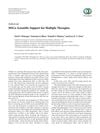
research Mesenchymal Stem Cells: Scientific Support for Multiple Therapies
Mesenchymal Stem Cells (MSCs) are promising for multiple therapies, but more research is needed to fully understand and optimize their use.
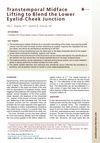
research Transtemporal Midface Lifting to Blend the Lower Eyelid-Cheek Junction
The transtemporal midface lift improves the lower eyelid and cheek area with high patient satisfaction and low complication rates.

research Generalized Calcinosis Cutis Associated with Probable Leptospirosis in a Dog
A dog's skin calcification condition resolved without treatment after a bacterial infection.

research Diseases on Hair Follicles Leading to Hair Loss Part I: Nonscarring Alopecias
Common types of non-scarring hair loss have various causes and treatments, but more effective solutions are needed.

research Clinical Case Notes: Lipoid Proteinosis - A Rare Disorder with Pathognomonic Lid Lesions
A baby boy with 13q deletion syndrome had eye cancer, a woman's vision improved after stopping a breast cancer drug, a man developed cataracts from using Propecia, and a rare skin disorder called Lipoid Proteinosis was discussed. Also, a tool called OCT is useful for diagnosing macular diseases.

research Cicatricial (Scarring) Alopecia: Clinical Presentations, Etiologies, and Histopathologic Features
Different types of scarring alopecia may be stages of one disease, and accurate diagnosis is crucial to prevent permanent hair loss.

research Tumor Necrosis Factor in Sepsis
Topical eye β-blockers might cause hair loss, which usually gets better after stopping the medication.

research Telogen Effluvium as a Sign of Hodgkin Disease
Hair loss may be an early sign of serious illnesses like Hodgkin disease.

research Quantitative Proteomic Analysis of Dermal Papilla from Male Androgenetic Alopecia Comparing Before and After Treatment with Low-Level Laser Therapy
Low-level laser therapy improves hair growth and dermal papilla cell function.
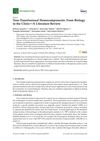
research Non-Transfusional Hemocomponents: From Biology to the Clinic—A Literature Review
The document concludes that products like PRP and PRF show promise for tissue healing, but evidence of their effectiveness is inconsistent.
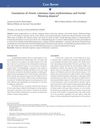
research Coexistence of Chronic Cutaneous Lupus Erythematosus and Frontal Fibrosing Alopecia
A patient had both chronic cutaneous lupus erythematosus and frontal fibrosing alopecia.

research An Ovarian Leydig Cell Tumor Undetected by Ultrasound in a Postmenopausal Woman with Hirsutism and Hyperandrogenism
A postmenopausal woman's hirsutism and high testosterone levels improved after surgery for an ovarian tumor not seen on ultrasound.

research Thermal Imaging and Dermoscopy for Detecting Inflammation in Frontal Fibrosing Alopecia
Infrared thermography, especially with dermoscopy, improves accuracy in diagnosing active hair loss due to inflammation.

research Testosterone in Women: Measurement and Therapeutic Use
Testosterone therapy can modestly improve sexual function in menopausal women but should be used cautiously and is not recommended for routine measurement in sexual dysfunction or hirsutism.

research Quorum Sensing and Other Collective Regenerative Behaviors in Organ Populations
Organs like hair follicles can renew themselves in complex ways, adapting to different needs and environments.
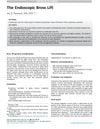
research The Endoscopic Brow Lift
The document concludes that the endoscopic brow lift is a less invasive cosmetic surgery that requires careful technique and patient selection to achieve lasting, aesthetically pleasing results.

research Current Concepts and Translational Uses of Platelet-Rich Plasma Biotechnology
Platelet Rich Plasma (PRP) shows promise for tissue repair and immune response, but more research is needed to fully understand it and optimize its use.

research Nocebo Effect in Dermatology
Negative expectations can cause adverse effects in dermatology treatments, like with finasteride for baldness, and careful communication can help reduce these nocebo responses.

research Anti-Müllerian Hormone Confirms the Novel Classification of Female Functional Androgenization Including Polycystic Ovary Syndrome
Anti-Müllerian hormone is a specific marker for ovarian issues in women with conditions like PCOS.

research Changes in European Legislation Make It Timely to Introduce a Transparent Market Surveillance System for Cosmetics
Europe needs a clear system to watch over cosmetics for safety and to make sure product claims are true.

research Restoration of Hair Growth with Topical Diphenylcyclopropenone in Mouse and Rat Models of Alopecia Areata
Topical diphencyprone helped regrow hair in mice and rats with a condition similar to human hair loss.

research Autoantigen Discovery in the Hair Loss Disorder, Alopecia Areata: Implications of Post-Translational Modifications
New protein changes may be involved in the immune attack on hair follicles in alopecia areata.

research Platelet-Rich Plasma and Cell Therapy
PRP and cell therapies may help with hair loss, but more research is needed.